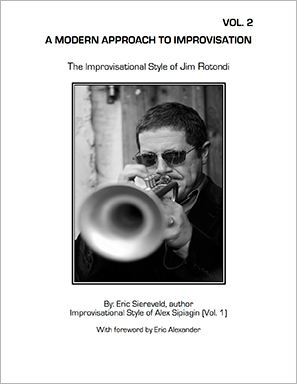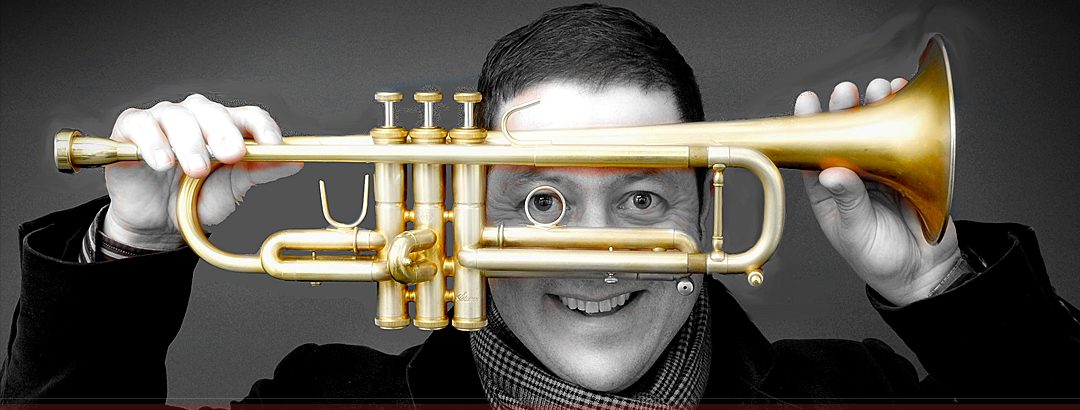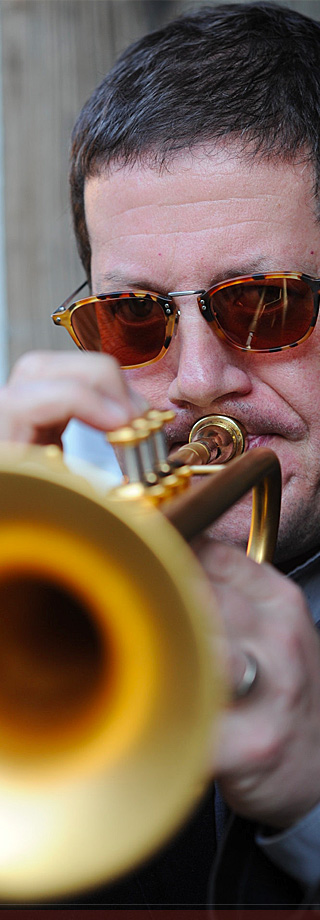
Jim Rotondi
Trumpeter, Composer, Arranger, Educator
Trumpeter Jim Rotondi has been a major figure in the world of jazz for over 30 years, both in New York and on the international scene. His sound, soul, and sense of swing have been in demand as leader and sideman all over the world.
A Montana native raised in a musical family, Jim started with the piano at eight years old and switched to trumpet at age twelve. Two years later Jim heard a recording of Clifford Brown and he was on his way. A product of the prestigious music program at the University of North Texas, Jim won first place in the International Trumpet Guild’s Jazz Trumpet Competition in 1984.
After relocating to New York, Jim toured and recorded with a host of jazz luminaries, including the big bands of Ray Charles, Lionel Hampton, Grammy-winner Toshiko Akiyoshi, Bob Mintzer, and the small groups of Charles Earland, Lou Donaldson, Curtis Fuller and Joe Chambers. Jim’s extensive recording experience most recently includes the 2016 release of his first date as a leader for the Smoke Sessions label, titled Dark Blue, following a host of successful releases on various labels. Dark Blue was very well received in the jazz world, receiving a 4-star review from Downbeat magazine.
Jim currently resides in Graz, Austria, where he is Professor of Jazz Trumpet at the University of Music and Dramatic Arts, after having been active professionally in the New York City area for 25 years. He has given clinics at Emory University in Atlanta, the Jamey Aebersold Summer Jazz Workshop and served on the faculty of the Stanford Jazz Workshop in Palo Alto, California, as well as having been Jazz Trumpet Professor at Rutgers University, and at the State University of New York in Purchase.
Jim continues to be an in-demand soloist and clinician performing all over the world. His focused and versatile solos are often studied by aspiring jazz musicians around the world.
For additional information please visit:
– http://jimrotondi.com
The Perfect Amalgam Of Power, Finesse And Logic
How To Become A Versatile, Focused And Passionate Jazz Improviser
Why did you choose music as your career?
Well, actually music was always in my family. My mother was and still is (at 94!) a piano teacher, so I grew up with music around the house, but more on the classical side. I started piano lessons at age 8 and trumpet at age 12. By the time I got to college, music was all I was really thinking about.
Did you ever want to give up on playing music?
No, never once. I have absolutely no regrets about choosing music as my life work. In fact, I always encourage students who might be considering a change to think long and hard about it, because a life in music offers rewards that no other choice offers.
Where you classically trained then switched to jazz and commercial music?
Well, I had a teacher when I was in junior high and high school, Larry Cragwick, who impressed upon me right away the importance of air support and breathing, and we worked on etudes and I even briefly worked on the Haydn and Hummel concertos, but I knew even then that that was not the style for me.
On days when you are not performing or rehearsing how long do you practice for?
Actually, I don’t practice with a time limit in mind so much as a goal. When I feel like I have accomplished that, or even approached it, then I feel like it was a successful practice day. But I should add that a long time ago I learned that an important component to good quality practice on a brass instrument is rest, so often, when I have a free day, I might practice something like 8 hours IN TOTAL, but the reality is that I pick up the horn, work on something for maybe 30 minutes, then I might sit at the piano and try to write or work on some changes, then come back to the horn 30 or 40 minutes later and so on, so the total time playing in that day was not even close to 8 hours.
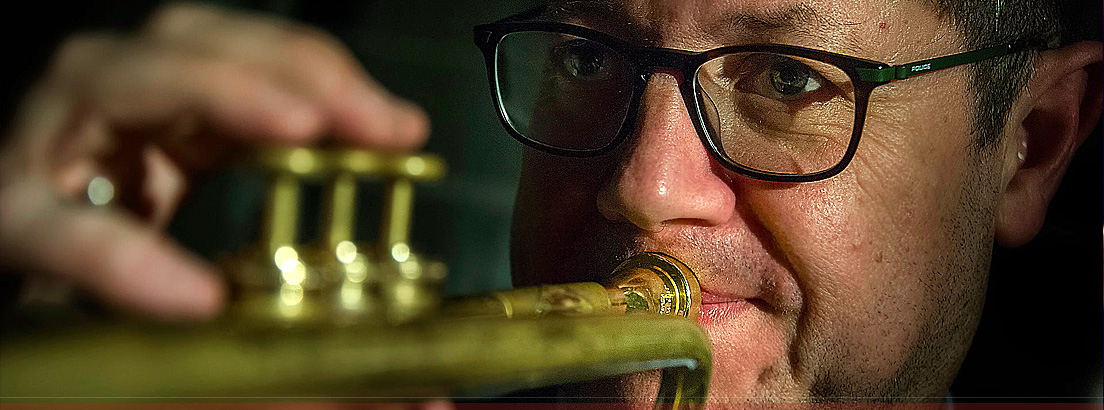
What do you mostly work on when at home practicing?
These days, since I’m teaching full time as well as touring, I find that technique practice is really the most important thing; keeping my chops together. When I’m in lessons I usually play a lot to demonstrate, or just to play, so I get a lot of improvisation practice naturally that way.
How long where you studying/playing jazz before your solos started sounding cohesive and professional?
Honestly, that’s something I’m still working on, although I would probably substitute the word musical for professional.
What kind of scales and patterns do you practice?
Actually, I don’t practice scales and patterns. I like to practice phrases that fit MELODICALLY over changes and possibly some phrases using substitute harmony, and I like scale practice for facility in all the keys, but I don’t practice those things for improvisation.
When you are improvising are you thinking about scales or are you simply playing melodies and ideas that are playing in your head?
As I explained, I don’t think about or practice scales as related to improvisation. I tend to lean much more towards melodies and melodic playing, both in my own playing and in my teaching.
When soloing, do you have the chord changes memorized or do you simply have an idea of shapes and colors of the tune?
Possibly a little of both. I like to study a tune at the piano first, to understand all the possibilities and the general direction, but after that I rely mostly on my ears. Both in my own playing and in my teaching, I like to internalize a tune rather than read it whenever possible. I feel that one of the true deficiencies of the iPad/cell phone generation is that we don’t use our EARS any more. We are much too reliant on electronic fake books, etc. I guarantee that you will never find a video of Miles Davis or Art Blakey in which the band is reading music.
Do you ever run out of ideas when playing a solo?
Well, I try to be prepared.
Are you normally not really concerned with the actual chord changes?
No, I would say I’m very concerned with the chord changes. That, to me, is part of the discipline of the music; to create a cogent improvisation based on the original melody and changes.
Do you write some ideas for the solo before heading to the studio?
Never.
Do you prefer to play with your own band or with other groups?
I guess there’s really no substitute for playing musicians you are really comfortable playing with.
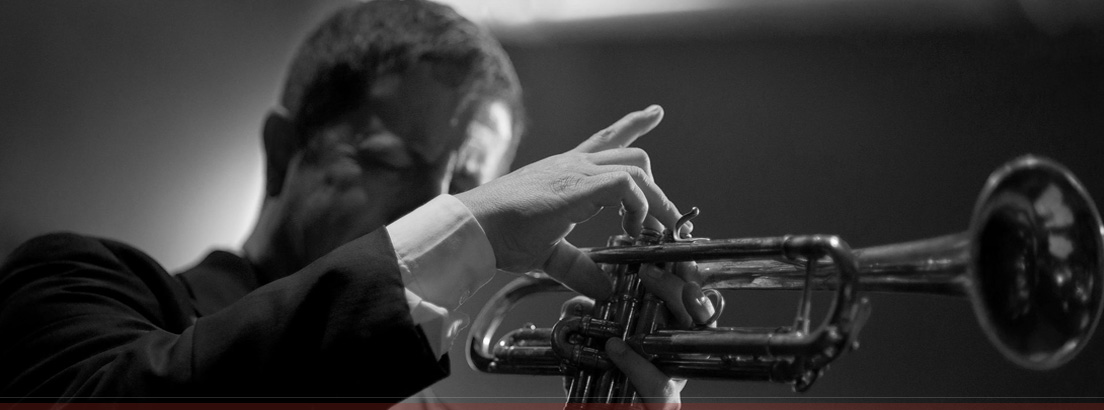
Do you approach your playing any different if you are playing with your big band as opposed to as a soloist in somebody else’s group?
Not consciously, but I can imagine that I might be a little bit less aggressive if I’m a side man.
Who do you listen to for inspiration?
My tastes are pretty diverse, so it’s not easy for me to answer that with a short statement. Depending on the day, I might listen to anything from Stevie Wonder to Ravel. I also enjoy checking out what younger musicians are doing. There is some really dynamic and interesting music out there these days.
Do you enjoy teaching or do you prefer to be out recording and playing instead?
I feel that one very often informs the other.
When recording, do you go for the first solo or do you do a few takes of the solo until you are happy with the result?
That depends on the take. At this point, I generally feel that the first take is the truest. It might not have absolutely perfect execution, but the feeling is usually better, so I’m always listening for that.
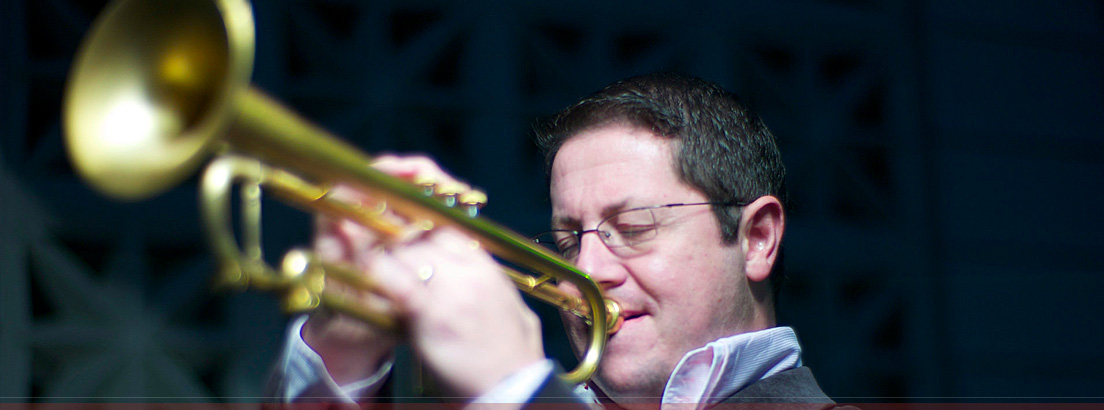
What equipment are you currently playing?
Most often I play on my Bb New York Calicchio trumpet made in 1945.
Occasionally, I play on my Stomvi USA model, gold-plated with a large bell.
My flugelhorn is a Stomvi Titan model.
Do you select different equipment depending on the group or what the job calls for?
Definitely. My Calicchio has a more typical sound, round but not too dark, solid core.
The Stomvi is a lot darker and so won’t work in situations that can call for brightness, like in a section.
How much time and effort do you put into composing?
I tend to experience periods of activity and inactivity, but when I am composing I generally am obsessed with it until it’s finished.
When composing do you work out a progression then a melody or does the melody come first?
It varies. Sometimes it’s the chords first then the melody, sometimes it’s the opposite.
The Art Of Developing A Cogent Jazz Trumpet Solo
Do you have a formula you follow when working on new compositions?
I often start at the piano, with a melody in mind, but also with chords in mind. Sometimes it’s the chords first then the melody, sometimes it’s the opposite.
Do you do the arrangements for your own compositions or do you delegate that to someone else?
I think most of my compositions are a combination of composing and arranging. The only time I have ever delegated arranging to someone else is if it’s for a larger ensemble, which is a situation I’m not that experienced with so I don’t really delve into it much.
Of all your compositions, is there one that is your all-time favorite?
There is a song I wrote years ago that ended up being the title track of One For All’s first CD, called “Too Soon To Tell”. That song has stayed in our book for about 20 years, so I guess I’m pretty happy with that one.
How much time and effort did it take you to complete your latest album?
Well the writing of it was a process that lasted probably six months, but we recorded the album in one day.
Now that you are an established soloist, what is your biggest career challenge?
When I was younger, it was a priority for me to do successfully anything that I was called for. As a more established artist, I feel it’s important to find things that are right for me, and not try to do everything that comes my way.
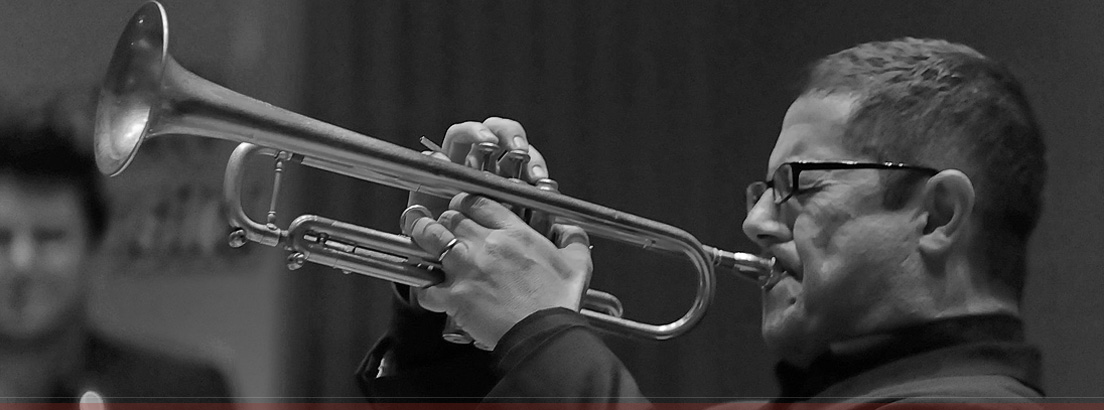
Serious music students use your solos as part of their learning tools, how do you feel about that?
Of course I am flattered by that, but if a student were to ask me, I would probably refer them to Fats Navarro.
I always tried to focus on many players and different instruments other than just trumpet so I wouldn’t sound like one person or another too much.
Did you ever imagine your solos would have such an impact on others?
Truthfully, no, but have they, really?
There’s a cumulative effect I think from years of putting out records…I Never imagined any of this really. Was in the right place at the right time. It still feels like I’m just starting out.
Best advice you would give to an upcoming player?
Now more than ever, be as versatile as you can be!!!
Best tip for anyone learning the art of improvisation?
Don’t use the real book, use your ears!!!
Jim Rotondi’s Solo on Ninny Melina
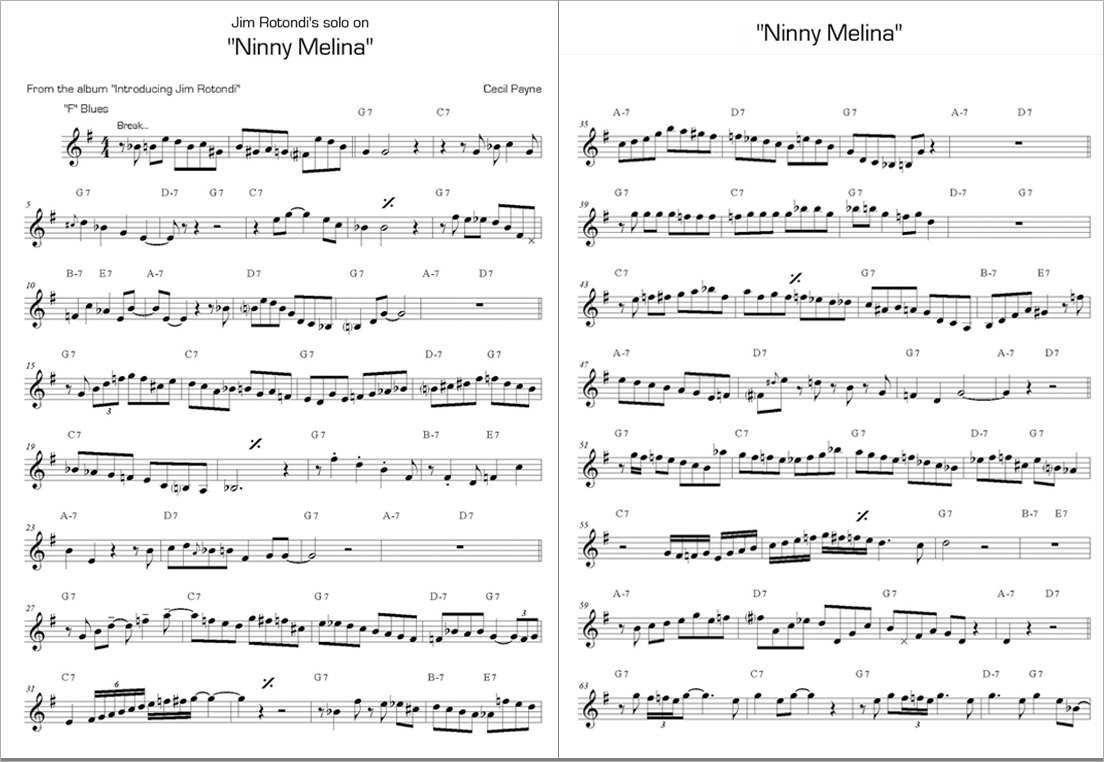
Listen to Ninny Melina’s Solo
This solo, transcribed by Eric Siereveld, gives a beautiful snapshot of Jim’s improvisational concepts and forward-looking ideas.
For additional solos by Jim Rotondi, check out the following book: